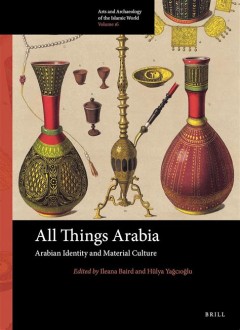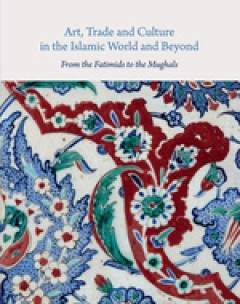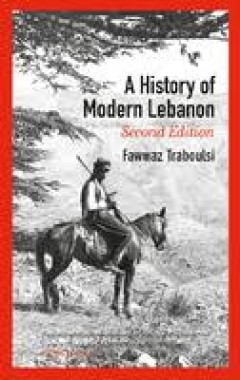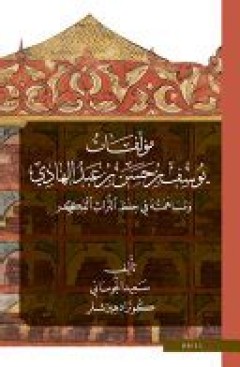Filter by

All Things Arabia
By employing the innovative lenses of 'thing theory' and material culture studies, this collection brings together essays focused on the role played by Arabia's things - from cultural objects to commodities to historical and ethnographic artifacts to imaginary things - in creating an Arabian identity over time. The Arabian identity that we convey here comprises both a fabulous Arabia that has h…
- Edition
- -
- ISBN/ISSN
- 9789004435919
- Collation
- 269 hlm; ill., lamp.,
- Series Title
- -
- Call Number
- -

Art Trade and Culture
The essays in this book trace a rich continuum of artistic exchange that occurred between successive Islamic dynasties from the twelfth through nineteenth centuries—as well as the influence of Islamic art during that time on cultures as far away as China, Armenia, India, and Europe. Taking advantage of recent technologies that allow new ways of peering into the pasts of art objects, the autho…
- Edition
- -
- ISBN/ISSN
- 9781914983238
- Collation
- oer.unej.ac.id
- Series Title
- -
- Call Number
- -

A Coat of Many Colors : Dress Culture in the Young State of Israel
A Coat of Many Colors investigates Israel's first seven years as a sovereign state through the unusual prism of dress. Clothes worn by Israelis in the 1950s reflected political ideologies, economic conditions, military priorities, social distinctions, and cultural preferences, and all played a part in consolidating a new national identity. Based on a wide range of textual and visual historical …
- Edition
- -
- ISBN/ISSN
- 9781644693261
- Collation
- 300 hlm
- Series Title
- -
- Call Number
- -

A History of Modern Lebanon - Second Edition
This is the second updated edition of the first comprehensive history of Lebanon in the modern period. Written by a leading Lebanese scholar, and based on previously inaccessible archives, it is a fascinating and beautifully-written account of one of the world's most fabled countries. Starting with the formation of Ottoman Lebanon in the 16th century, Traboulsi covers the growth of Beirut as a…
- Edition
- -
- ISBN/ISSN
- 9781849647281
- Collation
- 320 hlm
- Series Title
- -
- Call Number
- -

"The Neolithic Cemetery at Tell el-Kerkh"
The Neolithic Cemetery at Tell el-Kerkh is the second volume of the final reports on the excavations at Tell el-Kerkh, northwest Syria. The 12-year field campaigns at Tell el-Kerkh yielded several unexpected archaeological findings. The existence of the oldest cultural deposits from the early Pre-Pottery Neolithic B period (c. 8700-8300 BC) in northwestern Syria was revealed. The investigations…
- Edition
- -
- ISBN/ISSN
- 9781803270272
- Collation
- -
- Series Title
- -
- Call Number
- -

Tribal Reawakening and the Future of State-Building in Kuwait and Qatar
This open access book approaches the history of tribes and their role in the formation of the modern states of Kuwait and Qatar by blending historical, political, and sociological perspectives. Traditionally, this subject has been approached from single perspective, often picturing the tribe as a political and social entity that is opposed to the modern state. In the Gulf context, presenting an…
- Edition
- -
- ISBN/ISSN
- 9789819796632
- Collation
- XIII, 173hlm; ill., lamp.,
- Series Title
- -
- Call Number
- -

مؤلّفات يوسف بن حسن بن عبد الهادي ومساهمته…
On the basis of a newly discovered manuscript this book offers the most comprehensive bibliography of the enormous output of the fifteenth-century scholar Ibn ʿAbd al-Hādī – enlarging our view of his scholarly contribution and correcting numerous mistakes in this regard. This book is thus essential reading for all those interested in the writerly world of Damascus and the scholarly world o…
- Edition
- -
- ISBN/ISSN
- 9789004462922
- Collation
- 580 hlm; ill., lamp.,
- Series Title
- الحضارة العربية والإسلامية, Volume: 02
- Call Number
- -

Unfree Lives : Slaves at the Najahid and Rasulid Courts of Yemen
Unfree Lives illuminates Yemen’s forgotten history of slavery, as well as the transregional dimensions of slave trading in the Red Sea and wider Indian Ocean world. By analyzing Arabic narrative and administrative sources, Magdalena Moorthy Kloss reconstructs the lives of women and men who were trafficked to Yemen as children and then placed in various subaltern positions — from domestic se…
- Edition
- -
- ISBN/ISSN
- 9789004693784
- Collation
- 248 hlm; ill., lamp.,
- Series Title
- Studies in Global Slavery, Volume: 16
- Call Number
- -

Religious Minorities in the Middle East : Domination, Self-Empowerment, Accom…
The relationship between religious majorities and minorities in the Middle East is often construed as one of domination versus powerlessness. While this may indeed be the case, to claim that this is only or always so is to give a simplified..
- Edition
- -
- ISBN/ISSN
- 978-90-04-21684-6
- Collation
- -
- Series Title
- -
- Call Number
- -

Neo-Ottomanism and the Politics of Emotions in Turkey
This open access book explores the politics of emotions under the ruling Justice and Development Party in Turkey and the leadership of President Recep Tayyip Erdoğan. It examines how emotional politics and, particularly, the use of a Neo-Ottomanist narrative created a new national mood and contributed to the durability of Erdoğan’s rule. The author analyses the interactions between national…
- Edition
- 1
- ISBN/ISSN
- 978-3-031-48723-1
- Collation
- oer.unej.ac.id
- Series Title
- Palgrave Studies in Political Psychology
- Call Number
- -
 Computer Science, Information & General Works
Computer Science, Information & General Works  Philosophy & Psychology
Philosophy & Psychology  Religion
Religion  Social Sciences
Social Sciences  Language
Language  Pure Science
Pure Science  Applied Sciences
Applied Sciences  Art & Recreation
Art & Recreation  Literature
Literature  History & Geography
History & Geography